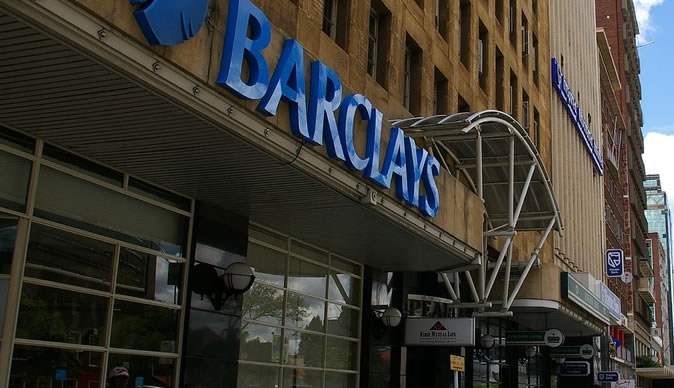By Shame Makoshori and Paul Nyakazeya
Group of Barclays Bank Zimbabwe workers were yesterday preparing to lobby government to block the bank’s takeover by Malawi’s FMB Capital Holdings (FMB), as it emerged that management’s rival bid had the backing of the cash-rich National Social Security Authority (NSSA).

NSSA chairman Robin Vela told the Financial Gazette that the fund had been willing to finance a bid led by Barclays Zimbabwe managing director George Guvamatanga, in exchange for equity-related returns, without taking shareholding in the bank.
“As NSSA we want to empower our locals with a proven record of running companies well. If you look at George and company, they have run the bank well and professionally. The results are there for everyone to see,” Vela said.
“We are looking at the bigger picture in this transaction, where shareholders would reinvest in Zimbabwe. I am not sure about the new investors if they will invest in Zimbabwe or elsewhere. That is where I am coming from. At the end of the day Barclays Plc decides who they want to do business with.”
The transaction has reportedly split the Barclays Zimbabwe board, but chairman Anthony Mandiwanza dismissed this as unfounded speculation.
“It is not true that the board is divided, it is a figment of someone’s imagination, and that person or persons are misinformed. This deal is between shareholders not board members,” Mandiwanza told the Financial Gazette.
“It is not the responsibility of the board to decide who buys into the bank, but of the shareholders. Even if management expressed interest and submitted their bid, it is a personal issue and not a company matter. They do not need board approval to proceed to make an offer.” Guvamatanga refused to comment on the matter, saying it was a shareholder issue.
Barclays Plc’s exit from Zimbabwe after 105 years, part of its withdrawal from the continent, looks set to navigate treacherous terrain before it is completed.
At least 63 low level managers went to court a fortnight ago to stop talks between Barclays Plc and FMB on the sale of the British bank’s shareholding in Barclays Zimbabwe, demanding the right of first refusal.
The workers suffered a setback last week when Barclays Plc announced the sale of most of its shareholding to FMB. The transaction now awaits regulatory approvals, expected by the end of the third quarter of this year.
Under the deal, FMB will take control of 41,2 percent of Barclays Zimbabwe, which will be rebranded as Barclays & FMB. Barclays Plc will retain a residual stake of about 10 percent in Barclays Zimbabwe. Workers are in line to get 15 percent of the bank’s shareholding in terms of a employee share ownership scheme.
Now, in a last-ditch attempt, the staff who have coalesced under the Barclays Bank Managers Association (BBMA), have decided to drop their High Court challenge dropped to lobby the Zimbabwe Stock Exchange (ZSE), the Reserve Bank of Zimbabwe (RBZ), the Ministry of Finance and Economic Development and the Ministry of Indigenisation and Economic Empowerment to prevent the takeover.
The BBMA this week instructed their lawyer, Rodgers Matsikidze, to withdraw the High Court case.
Matsikidze confirmed the developments to the Financial Gazette.
“I am confirming that we are filing our objections with the Zimbabwe Stock Exchange, the Reserve Bank of Zimbabwe, the Ministry of Finance and the Ministry of Indigenisation and Economic Empowerment on Wednesday (yesterday),” Matsikidze said.
Barclays Zimbabwe was listed on the ZSE in 1991.
The RBZ is the regulator of banking institutions, while the Ministry of Finance and Economic Development has overall stewardship of the entire financial services industry.
The 63 litigating managers, believed to be proxies of the BBMA, had thrown their weight behind a management consortium’s bid.
The Financial Gazette understands that the Barclays Zimbabwe managers would be between 20 and 30 percent of the financial institution.
To spread risk, the they had proposed that the rest of the stake would then be opened to other investors, including foreigners, according to details of the failed management buyout.
It is unlikely that Finance and Economic Development Minister, Patrick Chinamasa, and the RBZ governor, John Mangudya, would be amenable to blocking the FMB takeover, having steadfastly resisted aggressive moves by Indigenisation and Economic Empowerment Minister, Patrick Zhuwao, to indigenise foreign-owned financial institutions.
Zhuwao had last year given foreign-owned banks up to March to fully comply with the Indigenisation and Economic Empowerment Act, which compels foreign-owned companies to cede at least 51 percent of their shareholding to locals, or risk losing their licenses.
The foreign-owned banks had rejected Zhuwao’s demand for them to contribute 10 percent of their annual earnings to an empowerment levy in return for exemption from the indigenisation law.
Mangudya and Chinamasa had differed with Zhuwao, resulting in a fallout that ruined confidence and precipitated a capital flight and a cash crunch that resulted in banks failing to pay depositors on demand.
It only took the intervention of President Robert Mugabe, who is Zhuwao’s uncle, to stop the squabbling by the three parties after suspending application of the indigenisation law and insisting it would only be applicable to the resources sector.
However, there has been no amendment of the law to give effect to that decision.
Barclays Plc announced last year that it would be divesting from its African assets to focus on the high return British and American markets.
Zimbabwe and Egypt had been left out of a 2013 deal in which South African financial services outfit, ABSA, purchased eight of the financial services operations on the continent, before it was re-branded Barclays Africa. Financial Gazette






